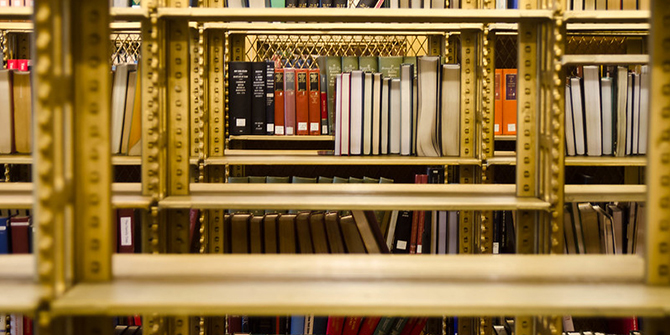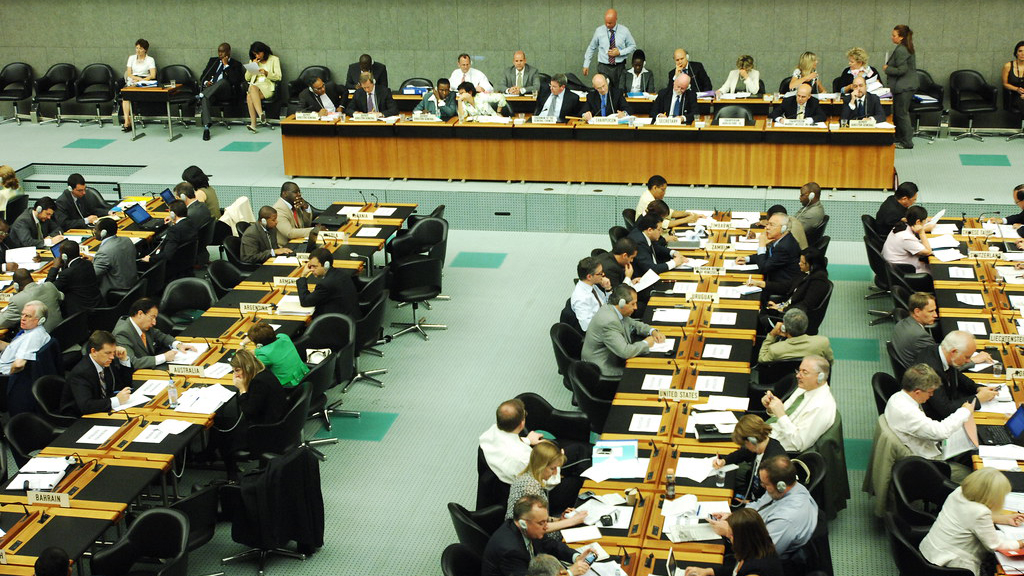By exploring the decolonisation of knowledge production in African and Development Studies, Laura Mann delved into the global North-South divide and academia’s need for a crisis of replication, uncovering the ways in which current systems reinforce the status quo towards poor scholarship.
This post is part of the blog and podcast series Citing Africa which explores the global construction and imbalances of knowledge production.
A few years ago, I read about the replication crisis rocking Psychology. It began when a group of scholars failed to replicate one of the field’s foundational studies, but it soon spread to other key studies and core ideas. Psychologists were forced to confront a scary reality; they no longer knew what was true or false. Their quality control systems had been so damaged by competitive publishing and career incentives that they had effectively shoved to one side their commitment to the truth.
Over the past two years, Syerramia Willoughby, Tin El-Kadi and I have developed a podcast and blog series, Citing Africa, about the decolonisation of knowledge production in and about African countries. We have come to the conclusion that Development Studies and African Studies may be in their own Replication Crises.
Originally, we had much smaller ambitions: a podcast aimed at junior scholars from African universities which would give practical advice on how to publish in peer-reviewed journals. A few of our episodes still focus on these practical matters: ‘How do I choose a journal? How do I prepare my work and navigate peer review? How should I deal with the harsh and often ego-damaging feedback that I receive in the process?’

Yet we quickly realised that our supposedly small and self-contained ‘side project’ was exploding into something bigger and much thornier. Ultimately this project has transformed the way we think about ‘truth’ and ‘knowledge’ within our fields.
My first inkling that explosions were on the horizon came during one of the lunchtime breaks at the European Conference on African Studies (ECAS) in Basel, Switzerland in 2017. I had regularly attended ECAS conferences since my first ECAS in Uppsala in 2011 and had always found them to be inspirational and provocative. It was nice having my brain massaged by new ideas and I loved seeing old friends and colleagues from previous study and workplaces: Edinburgh, Oxford and Leiden. I don’t think I ever fully appreciated how few colleagues I saw from my other study and workplaces: the University of Khartoum, the National University of Rwanda and the University of Nairobi. I was too caught up in the pleasure of old friends and new ideas.
Basel broke that spell. I spent the whole week madly rushing around during the breaks, trying to interview lots of African-based scholars about their experiences attending ‘international’ conferences and publishing in ‘international journals’. It was not an easy task reaching out to new people when so many old friends wanted to catch-up. The internet kept cutting out at pivotal moments and the hallways were often filled with noisy, boisterous people celebrating happy reunions with one another. For these reasons, many of these interviews I conducted at ECAS could not be used because there were too many crazy sounds in the background (I have learned important lessons not only about knowledge production but also about sound quality too!).
This experience of purposefully seeking out and listening to new colleagues from African universities made me realise how few new connections I actually make at these conferences. Panels are largely segregated by institutional networks.
For example, in Basel, I presented on two panels. One was a double session where I knew everyone else and whom all came from a small cluster of European universities. The other panel was more mixed but, then again, the only African-based scholar in my session presented in French, and so it was difficult to connect with her research. Almost all of the Political Economy panels I attended were similar: the same little clusters, the same people, and very little opportunity to make new connections.
At Basel, I also made an effort to attend panels specifically on knowledge production and, in these panels, the mould was broken to an extent with more African-based speakers and the chance to make a few new connections. Yet this pattern of segregation was repeated elsewhere. During the aforementioned lunch period, I looked across at the cafeteria and was shocked at how segregated the rows of tables were – a table of almost exclusively white scholars, a small group of almost exclusively African scholars, a table of almost exclusively white scholars, a small group of almost exclusively African scholars, and so on. There was very little mingling.
Similarly, one evening, I attended a party organised by a group of scholars from one British university and realised there was one single African scholar present at the event (and he was based at that British university). To be clear, there were scholars from other British and American universities coming together, but not a single scholar from an African-based university. I realised in one (very belated) rush of horror that I was effectively not coming to the European Conference on African Studies to meet and receive feedback from scholars from within African countries. Essentially, I was coming to network with people whom I already knew, and these people were largely from European- and American-based universities.
Let me share a very different experience. During my PhD fieldwork in Khartoum, Sudan, my friends Paul Fean, Alden Young and I decided to organise the ‘Sudan PhD student Seminar Series’. We organised it in our living rooms and tried to make it open to all: foreign research students, Sudanese research students based at foreign universities, Sudanese research students based at Sudanese universities, other researchers from organisations like UNICEF and Practical Action and friends of mine who wanted to come along because they were curious about what social science could say about their country. It was low budget: popcorn, soda drinks and a terrible mini-projector that eventually came to a sticky and undignified end.
And yet it was wonderful, and very productive for good ideas. The audience really knew the context and there were genuine discussions involving both ‘academics’ (both Sudanese and foreign) and my ‘non-academic’ Sudanese friends. My own PhD was about the expansion of higher education and its impact on the labour market and so, from this audience, I was able to get no-nonsense feedback on my work from those with first-hand experience of Sudanese education commercialisation and graduate unemployment. The group made me see things that I had misunderstood and opened up new avenues of inquiry. It also made me more sensitive about the ways in which I represented the lives of my respondents, and it made me care more about what I was doing.
When I returned to Edinburgh, my supervisors and the wider academic community of Edinburgh could tell me what the academic literature said and whether my ideas were interesting or provocative (and just to be clear, I had WONDERFUL supervisors), but they could not necessarily scrutinise my evidence base nor upend my own positionality and limitations. To a large extent, my positionality was similar to theirs. That seminar series in Khartoum was unfortunately a thing of rare beauty.
When we submit our work to the ‘leading’ journals, and when we present our research at the ‘leading’ conferences, we want to get the best feedback we can about our work. We want to be held accountable for silly ideas. We need to be made aware of our analytical or methodological mistakes and we need to be pushed to do our very best work: sometimes that means being more ambitious but, more often than not, it means being less ambitious because our empirical material does not support the grandiose things we want to say.
We all need more nuance, more care and more eyes on deck. Peer review can be beautiful when it works well: informed people giving you helpful criticism before it is too late, before those silly old ideas see the light of day. The best-case scenario is that your silly idea opens you to embarrassing criticism and public humiliation (if the public ever sees your work). The worst-case scenario is that the silly idea (with the clout of academic authority) actually does influence policy-making in some ‘impactful’ but disastrous way. And let us be honest, scholarship has impacted African trajectories of development in profoundly irrevocable ways, and seldom are the scholars responsible ever held accountable.
After two years of researching this podcast project, I really worry whether our current systems are reinforcing the status quo towards poor scholarship. I fear we may not even realise that we are stuck within our own ‘Replication Crisis’ because we are so preoccupied with high Impact factors and exercises like the REF that we don’t even see how detached we are from reality. Editorial boards, ‘international’ conferences and funding review bodies are dominated by non-African academics who are socially distant from the countries in question and may in fact have no idea what is really going on in a particular university or agricultural extension system or parliamentary group in another country.
To be clear, this problem does not only affect scholars from outside these networks who struggle to get in. It also affects scholarship itself; bad ideas are reproduced and become paradigmatic. One of my interviewees, Akosua Darkwah from the University of Ghana, told me about her experience going to a conference in the US and hearing a scholar present something factually incorrect about Ghana, and yet no-one corrected him/her. I, for one, was once part of a team that received funding to study a phenomenon in an African country that didn’t actually exist, and yet our project had received high peer reviewed scores.
But it is not just peer reviews that need to be re-thought. We need to examine the relationship between academic communities and the wider public. It is highly unusual for non-African scholars to present their work in the spoken language of the country or community in question and so rarely are these ideas exposed to feedback from ordinary (non-elite) members of the public. Many of our methodologies are actually designed specifically to avoid the use of African languages, in effect isolating ideas from the very people who might be best placed to judge them worthy or benefit from them. Some of these methodological limitations may even become reproduced amongst African scholars who are trained outside of Africa and come to these particular methods as ‘more rigorous’ and more acceptable to dominant journals.
Scholarship as a whole becomes detached from the world it seeks to explain and engage. One can only conclude what kind of ‘impact’ current systems seek to promote.
I am a strong believer in ‘outside perspectives’ and I have learned a great deal about Britain from my friends from other countries. After one month in the UK, an immigrant can identify many strange and terrible things about British society, which I cannot see myself. Indeed, one huge reason we need more decolonisation is that we need to bring African (and other non-Eurocentric) experiences to bear on the linear stories we tell ourselves about ‘development’ (and how highly unusual European and American ‘development’ has really been).
Moreover, outside perspectives need to be in dialogue with insider perspectives if they are to be productive and tethered to the truth. And there are different kinds of insides and outsides within a society. There are plenty of sides of British society that a recent immigrant in London may never see: the longitudinal data one gathers from attending extended family gatherings over a lifetime, the perspectives one gathers from a rural childhood amongst people who are often subject to clichés and misunderstandings by those in London. Decolonisation is as much about understanding the way paradigms reproduce knowledge within each society as well as across them.
A lot of the decolonisation efforts I have come across in the last two years have been aimed at building research and writing capacity within African universities so that African-based scholars can participate in more ‘mainstream’ academic debates. This work is hugely important. Yet at the same time, I fear we may be leaving some of our deeper colonial practices in place: how do we really know what ‘we’ within mainstream networks produce is actually true? In which languages and forums do we validate our ideas and insights? Whose scrutiny is being sought out and whose scrutiny is considered ‘not academic enough’ or illegitimate? Are we satisfied with the feedback and exchange of ideas we receive?
Of course, there are powerful pressures pushing us towards the status quo, especially those junior scholars worried about getting their first jobs or promotions: who do I need to impress? Whose authority can validate my work and status? Which publication will make me more visible to the ‘right’ people? And yet, if we are honest about our calling in life, the decision to pursue the truth, forsake all riches and abandon any hope of a healthy work-life balance, then surely one must prioritise nuance and honesty over authority and accolades, right? We all want to find the truth, right? That’s what we’re all here for.
Our podcast series aims to place the peer review process within these wider discussions about decolonisation. From the very start, we want to make it clear that this mission is as much about the quality of scholarship as it is about equality between scholars. The two go together hand in hand.
To me, the movement is ultimately about building structures of knowledge production and exchange that provide an accurate, engaged and nuanced sense of what is actually going on in the world and what people really think. We have done our best to represent these debates from different sides: from the perspectives of those who study citation rates and co-authorship, from those who teach and study core curriculum, and from those who have long-term historical perspectives on the evolution of knowledge in and about African countries.
Surely, we have not been able to capture everything and everyone in our short nine-part series, but we hope our stories will open up wider discussions and encourage more people to ask themselves whether they are happy with the status quo and what can be done to build a more rigorous quality control of knowledge. We also hope that our podcast series will inspire more junior African scholars to wade into academic debates with confidence and be better equipped to navigate the sometimes intimidating and slightly mysterious world of the peer review.
Finally, we want to thank everyone who gave us their time and ideas. We were unable to use all of our sound clips, particularly as we faced a somewhat steep learning curve when it came to sound quality! Nevertheless, every interview helped us understand the issues at hand and to put together our stories. Thank you so much!
The Citing Africa project was funded by the LSE Knowledge Exchange and Impact Fund with generous support from the Review of African Political Economy and LSE’s Department of International Development.
Listen to our podcasts and read more about the #CitingAfrica project.
Laura Mann is a sociologist based at LSE. Her research focuses on the political economy of markets and new information and communication technologies in Africa.
The Citing Africa podcast investigates the decline of Africa-based contributions in top international academic journals, provides practical guidance to young scholars seeking to publish their own work and takes a critical look at the wider context of knowledge production about the African continent.
The views expressed in this post are those of the author and in no way reflect those of the Africa at LSE blog, the Firoz Lalji Centre for Africa or the London School of Economics and Political Science.






4 Comments